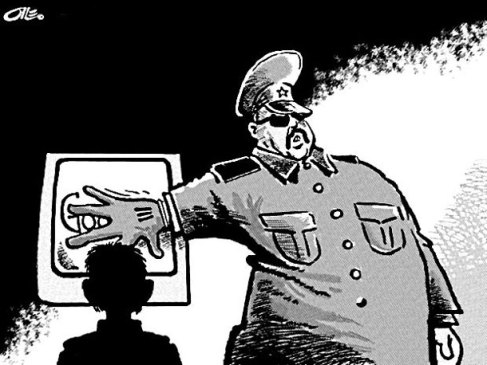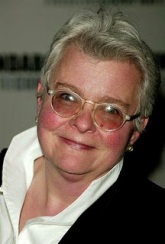Censorship & the performing arts in Malaysia: a case study
This was supposed to be a straightforward review of a not-so-straightforward play, The Baltimore Waltz by the award-winning playwright Paula Vogel, directed by Rey Buono and produced by the Instant Café Theatre. However, external circumstances sometimes intrude and irrevocably alter the course originally intended.
The play was very nearly cancelled. Indeed, one day before opening night, The Baltimore Waltz was banned by DBKL (Dewan Bandaraya Kuala Lumpur aka City Hall) which issues public performance licences for all shows staged in the Federal Territory. DBKL have thus far been, to their credit, fairly cooperative, easygoing and mature about this ruling – until the recent flap over The Vagina Monologues (which saw a very successful initial run, only to have its application for an extension rejected).
Producer Adeline Tan and artistic director Jo Kukathas filed an urgent appeal with DBKL and, after agreeing to extensive cuts, were given permission to stage the play as scheduled. This, in itself, is reason to celebrate: firstly, the never-say-die feistiness of ICT and the cast of The Baltimore Waltz, which saved the show; and secondly, the fact that the show did go on indicates that the people who work at DBKL aren’t TOTALLY unreasonable and are, to a certain extent, still open to a little give-and-take. After all, a tremendous amount of energy, time, money, and talent goes into a theatrical production of this caliber – and it only takes one “TAK BOLEH!” to see everything go down the drain. Theatergoers will be condemned to a boring plastic future of uncontroversial plays and harmless frolic – because potential sponsors will inevitably balk at any material that extends the frontiers of artistic expression.
This is a good time for all of us, whether or not directly involved in the performing and cinematic arts, to reassess how we really feel about being told what we can and cannot see and hear on stage or on the screen. Who decides and why? Censorship, no matter what the excuse, ultimately serves only to retard us mentally and culturally infantilize us. This may suit you fine if you happen to be in business or the bureaucracy – after all, a bunch of docile, overgrown kids are easy to keep in line with candy and canes (or bread and circuses).
Malaysia’s censorship laws, like our notorious Internal Security Act, are a legacy of the British administration. Archaic, irrelevant and unnecessary though they be, these laws are a convenient foil against any attempt to change the status quo or overthrow the ruling regime through nonviolent means. I’d like to quote extensively from my review of Chin San Sooi’s heavily censored play, Morning In Night, published in the New Sunday Times of August 24, 1986:
Freedom of expression isn’t something one can take for granted. Even in merry England, the necessity of getting official sanction for all plays was a centuries-old thorn in the side of the theater community – until 1967 or thereabouts when Kenneth Tynan led a successful campaign to abolish the all-powerful rôle of the Lord Chamberlain in granting public performance permits.
The history of secular censorship in the English theater goes back to a Playhouse Bill proposed by Robert Walpole in 1737. As First Lord of the Treasury and Chancellor of the Exchequer, Walpole was in a highly favorable position to amass great personal wealth through corruption; he was, in fact, unofficially England’s first Prime Minister and not without his critics, who often resorted to the symbolic weapon of the stage to lampoon his inflated political ambitions. Walpole’s Playhouse Bill passed into law and all scripts were subjected to the Lord Chamberlain’s scrutiny; the Lord Chamberlainship, naturally, was an office appointed by the Lord Chancellor of the Exchequer. The fact that it took the English 230 years to rid themselves of this particular nuisance shows how difficult it is to unmake unnecessary laws.
I hear voices piping up: “But, but… there HAS TO BE some form of control over artistic output or the whole nation will be plunged into chaos!” Well, let’s remind ourselves that originally all artistic expression was regarded as the chief means by which Divine Intelligence (or the Collective Psyche) revealed itself to mankind. If we’re going to run around hysterically plugging up these channels of intercommunication just because some of them threaten our narrow understanding of life, would that not precipitate our worst fears and bring about a monopoly of the Truth wielded by vested interests? Humans, in their faithlessness and folly, love to make laws, which the smarter ones break. Wise is he who knows how to unmake laws.
So much for censorship. I don’t have anything positive to say about any form of censorship – and don’t give me that cynical crap about “multiracial, multicultural sensitivities.” The only chance we have to resolve any human conflict is through honest, uncensored communication; and the best people to attempt this task are our writers, thinkers, and performers – not bureaucrats and politicians!
How about the play itself? I didn’t care too much for Paula Vogel’s writing, although I think the play is an instructive study for aspiring playwrights in its clever use of cinematic devices, literary allusions and cultural clichés. Vogel’s insights and responses are circumscribed by the intellectual materialism of her academic background. Her script, which humanizes the experience of being gay and dying of AIDS, may evoke sympathy for AIDS sufferers in particular and homosexuals in general – but her typically American (Hollywood?) sentimentality about death and dying came across as trite. I’d have been a great deal more intrigued if she had at least alluded to the possibility that the HIV virus was a top-secret population-culling project of the WHO that went awry. Fortunately Vogel managed to poke some timely fun at Big Medicine, pharmaceutical companies and their professional quackery and chicanery.
Despite the initially amusing, then annoying, surgical excisions – goodhumoredly captioned with slide announcements like: “UNACCEPTABLE DIALOGUE REMOVED” or “UNACCEPTABLE REMOVAL OF CLOTHING REMOVED” – the play was elegant and sophisticated, and might well have marked a new level of artistic achievement in KL theater. Rey Buono showed himself once again to be an imaginative, intelligent, and inspired theater director who combines craftsmanlike competence with poetic passion.
The cast deserves a tremendous round of applause for the superhuman effort they put into entertaining their audiences, in the face of the dreadful uncertainties and bureaucratic stress they were all subjected to. Rohaizad Suaidi was credible and animated as Carl; Ghafir Akbar was remarkably versatile with his multiple quick-change characterizations; and Joanna Bessey was simply lovable as Anna. Theirs were technically challenging rôles – especially Ghafir’s – and I felt they could have fine-tuned their characterizations a great deal better without the help of DBKL’s censorship board. As things turned out, it was like going to the cinema and seeing a goondu’s hand blocking the projector every time an “objectionable” scene came up. Unwittingly, DBKL (as the symbol of official repression) became the fourth member of the cast and their performance was, frankly speaking, shameful.
Malaysians are generally a patient lot but are we prepared to put up with mediocrity forever? Because that’s what censorship ultimately breeds. I certainly hope not. It’s like granting the butler the power to stop you from leaving home if he felt you weren’t “suitably” dressed. Or allowing the security guards to decide what books to order for the library and what books to burn.
An advanced culture loves and accepts diversity in all things and allows free exchange of ideas. It doesn’t stifle artistic expression and suppress truthspeaking theater. Seems like we’re a little backward when it comes to cultural maturity.
[First published in kakiseni.com in June 2003]










